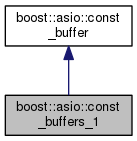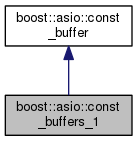Adapts a single non-modifiable buffer so that it meets the requirements of the ConstBufferSequence concept. More...
#include <buffer.hpp>


Public Types | |
| typedef const_buffer | value_type |
| The type for each element in the list of buffers. More... | |
| typedef const const_buffer * | const_iterator |
| A random-access iterator type that may be used to read elements. More... | |
Public Member Functions | |
| const_buffers_1 (const void *data, std::size_t size) | |
| Construct to represent a given memory range. More... | |
| const_buffers_1 (const const_buffer &b) | |
| Construct to represent a single non-modifiable buffer. More... | |
| const_iterator | begin () const |
| Get a random-access iterator to the first element. More... | |
| const_iterator | end () const |
| Get a random-access iterator for one past the last element. More... | |
Related Functions | |
(Note that these are not member functions.) | |
| const_buffer | operator+ (const const_buffer &b, std::size_t start) |
| Create a new non-modifiable buffer that is offset from the start of another. More... | |
| const_buffer | operator+ (std::size_t start, const const_buffer &b) |
| Create a new non-modifiable buffer that is offset from the start of another. More... | |
Adapts a single non-modifiable buffer so that it meets the requirements of the ConstBufferSequence concept.
| typedef const const_buffer* boost::asio::const_buffers_1::const_iterator |
A random-access iterator type that may be used to read elements.
The type for each element in the list of buffers.
|
inline |
Construct to represent a given memory range.
|
inlineexplicit |
Construct to represent a single non-modifiable buffer.
|
inline |
Get a random-access iterator to the first element.
Referenced by end().
|
inline |
Get a random-access iterator for one past the last element.
References begin().
|
related |
Create a new non-modifiable buffer that is offset from the start of another.
References boost::asio::b, boost::asio::buffer_cast(), and boost::asio::buffer_size().
|
related |
Create a new non-modifiable buffer that is offset from the start of another.
References boost::asio::b, boost::asio::buffer_cast(), and boost::asio::buffer_size().